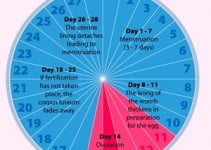
Our body is made to deal with stress only on a short-term basis. If you are overly stressed for an extended period, especially as a woman, you could become vulnerable to serious health conditions. This includes problems that will affect the female reproductive system. In this article, you can find information about stress and menstrual cycle.
Is Stress Really Affecting your Period
There is not a lot to show the connection between menstrual periods and stress. However, some studies indicate that stress plays a role when it comes to how the hypothalamus functions. The pituitary gland, which is the master gland of the body, is controlled by the hypothalamus.
This pituitary gland controls the adrenal and thyroid glands as well as the ovaries, all of which works together to control the hormones.
If the ovaries are not functioning properly, this might result in problems with ovulation, estrogen production or other reproductive developments. Estrogen hormone is very important as it helps to build up the uterine lining and prepare the body for conception or pregnancy. In the event of ovarian malfunction, you can experience side effects, which involve the irregularities in menstruation cycle.
A recent study for stress and menstrual cycle suggests that stressing early in the cycle can lead to pronounced symptoms both before and during your period. If you are reportedly feeling stressed before the start of your period, let’s say for about two weeks, you are two to four times likely to experience mild to severe symptoms.
Even other studies show that when there are high stress time periods, such as wartime and famine, fertility rates drop which indicates that the stress of these times are affecting the way the body is working.

Our bodies know that it’s not the best time for having children. But this isn’t the only thing that changes menstrual cycle and it doesn’t have to be that serious, it could be increased stress at work, illness, and even a new high demand workout schedule is putting stress on your body and affecting the menstrual cycle.
It might not only be stopping your period only, but it can also make your period longer or shorter, heavier or lighter. You might just think that your body is working against you, but in reality, you are most likely working against your body. The more stress you are under, the more you are affecting the body’s regulatory functions.
It Can Increase PMS symptoms
Premenstrual syndrome occurs around the ovulation period and it involves psychological and physical symptoms which might continue into the early days of your menstruation. This includes symptoms such as anxiety, feelings of anger, mood swings, fatigue, depression, reduced concentration, abdominal bloating, breast tenderness and swelling, crying spells, irritability, lower back pain, cramping, cravings for salty and sweet foods, and general aches.
Even when you consider just PMS you have to consider other gastrointestinal issues that can come from additional stress such as diarrhea and increased urination which can also create more issues and general feelings of being uncomfortable especially during your period.
It Can Affect the Hormone Balance
Chronic and acute stress can profoundly change your hormone balance and causes irregular, late or missed periods. Some researchers also discovered that women will feel the effects of stress and menstrual cycle when they work in stressful jobs. If you are working in this environment, you are fifty percent more at risk to have a shortened cycle of fewer than twenty-four days [1]. As your stress levels increase, your menstrual period can stop temporarily, a condition called secondary amenorrhea.
Stress can also lengthen your menstrual cycle, make it become more painful or stop it completely. Our bodies are capable of stopping reproduction if the system isn’t stable, both physically and emotionally, because the hypothalamus will stop the ovulation cycle if necessary to heal.
Overall, it is safe to say that women with high-stress levels are more likely to experience mild to severe symptoms before and during menstruation. The high-stress levels also cause BV or Bacterial Vaginosis [2] and if you are pregnant this could cause your baby to develop allergies or asthma later on in life.
Getting Back to Normal
A good way to control the effects of stress and menstrual cycle is by doing Yoga exercises. But Remember, it could also be your bodies way of telling you that you literally have enough to deal with right now and to take a break and relax before adding the stress of having a child in your home.
In addition to yoga, you can also consider other non-traditional treatments to regulate stress such as meditation and massages, as well as acupuncture.
While we did say that a new routine can affect the body negatively, it could also help your body to release endorphins to make you feel better and also help to reduce stress by letting out that frustration.
Eating right is also a great way to help the body relax. Eating a balanced diet and including healthy foods such as salmon, nuts, and dark chocolate can help to reduce stress levels.
Other than that you can also just take some you time and relax. Don’t take on anything new for a while and enjoy some free time. Many of us try to get so many things done for our families and our jobs that we forget to take care of the most important person, “Us”.
If you are looking to medicinally regulate your cycle because of a stressful life, there can be options such as hormonal birth control. For some, this is the easiest of the solutions because it’s easily regulated.
This is not a bad option in the least as many use birth control to regulate their flow, especially if they have heavy or irregular periods. Whichever method you wish to use, give it some time to let your body heal.
References
- https://academic.oup.com/aje/article-pdf/149/2/127/330210/149-2-127.pdf
- https://www.ncbi.nlm.nih.gov/pmc/articles/PMC2367104/



